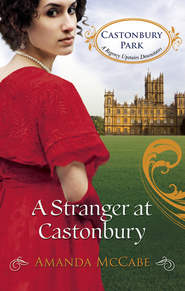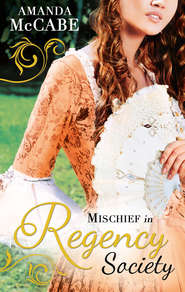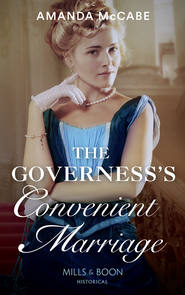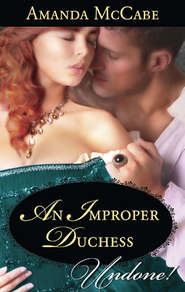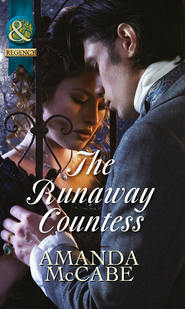По всем вопросам обращайтесь на: info@litportal.ru
(©) 2003-2025.
✖
A Regency Duchess's Awakening: The Shy Duchess / To Kiss a Count
Настройки чтения
Размер шрифта
Высота строк
Поля
“Yes. For you are not dancing at all, but sitting here talking to me.”
“So I am,” he said, laughing. “And believe me, Lady Emily, it is a far more pleasant party for it. I would much rather sit somewhere in quiet conversation than be crowded into an overheated ballroom with a lot of strangers.”
“Me, too. Balls are …” Hateful things. “Most inconvenient.”
“But a necessary evil for people such as us, you were quite right about that, Lady Emily.” He rose to his feet, offering his hand to help her rise.
Emily hesitated for a moment as she studied that hand, remembering the strange, wondrous sensation of being held by him. She slowly slipped her hand into his. His fingers closed over hers, just as warm and strong as before, and she had the wild wish that they could just stand there for the rest of the night.
But they could not, of course. His touch slid away from hers. “Since I must dance, Lady Emily, would you favour me with the next set?”
“I.” Oh, how her parents would love that. Their daughter dancing with the Duke of Manning for everyone to see. But her legs still felt none too steady, and she feared that rather than inciting envy at her handsome partner and graceful movements, she would fall again and make a fool of herself.
And the last thing she wanted was for him to think her a fool. He and his family surely already thought that after last summer’s party.
“I think I need to find the ladies’ withdrawing room, your Grace,” she said. “I seem to have torn my hem when I tripped.”
He smiled at her, and bowed politely. “It is my loss, then. Perhaps we can dance at the next ball.”
And perhaps cows would take wing and fly around Berkeley Square. “That would be most pleasant.” “Shall I escort you to—?”
“Oh, no,” Emily said quickly. “No, I’m sure our hostess will be wondering where you are. I am quite well now, your Grace, thanks to your gallant rescue.”
“I hope the rest of your evening is less perilous, Lady Emily.”
Emily bobbed a hasty curtsy, and hurried away across the foyer. She knew not what direction she was going, or where. She just had to be away from him, from the way he made her head spin so confusingly, in order to think clearly again.
But she felt the warmth of his stare on the back of her neck as he watched her go.
Chapter Two (#ulink_6b5c8206-d9de-56f8-b4da-4c721ca752ec)
“What a charming party last night!” Emily’s mother said as she buttered her breakfast toast.
“Mmm,” Emily murmured. That was really all the response her mother ever required to her morning chatter. Fortunately so, for Emily didn’t care for mornings—especially when she was already preoccupied with other matters.
“Lady Orman is such a fine hostess,” her mother went on. “And Robert and Amy were so admired, of course. I’m sure next year they will have their own household and can give such soirées themselves. That is so essential in building a political career.”
“Yes, indeed,” said Emily. She was sure Rob and his wife would be most happy to get out of their parents’ house, to escape. It would be wonderful beyond words to have one’s own home, a place of quiet serenity and cosy little nooks for reading and thinking in peace.
Emily almost laughed aloud at her own silliness. Rob’s house would never be in the least serene—he and Amy liked noise and action and parties. Emily dreamed of her own house, a place where she could order things to her own liking and be truly comfortable at last. She might as well dream of going to live on the moon. She couldn’t afford even the tiniest cottage in the most obscure corner of the country, and even if she could her parents would never let her leave. Her only escape would be to marry. And that seemed distant as well.
Ever since childhood she had dreamed of a place where she could be useful, where she was needed. She dreamed of children, a home. She was still searching for that, but she was sure one day she would find it. Or at least she hoped she would. It would be the best thing for all.
Emily sipped at her tea, and remembered the terrible event that had led her to this place. She had always been shy as a child, and her mother had long urged her to open up, to make friends. Emily herself longed for friends, but knowing what to say to new people was never easy. Until she made her début in London and met a certain Mr Lofton, a handsome young man who seemed to like her very much. Too much, as it turned out. She agreed to walk with him in the garden at a ball one night, and he grabbed her and attempted to force his kiss on her.
In her revulsion, she trod hard on his foot and kicked him on the leg, making her escape as he howled with pain. “Teasing whore!” he called after her as she fled in tears. And thereafter he never talked to her again, though she never forgot the terrible smothering feeling of his kiss. If that was what came of letting her guard down, she would never do it again. She retreated into herself, and did not tell her parents or brother what had happened. She only wanted to forget it.
But sometimes, like now, the memory haunted her once again.
Her mother, who noticed none of Emily’s inner turmoil, gave a deep sigh, setting the ribbons on her cap to fluttering. “But they must have a proper house, of course! One large enough for entertaining. One like Devonshire House or Manning House, really. If only they had someone to help them as they deserve.”
Someone like the Duke of Manning, owner of that grand Manning House? Emily reached for her teacup with a sigh of her own, thinking of the look in his eyes when she refused to dance with him. So puzzled. Ladies surely seldom refused a duke, especially a young, handsome one. Yet how could she tell him of her awkwardness on the dance floor? She felt so silly when she thought of it all.
“Yes, Mama,” she said.
Her mother shot her a sharp glance over the toast rack. “You did not dance last night, Emily.”
Emily glimpsed the ragged edge of her thumbnail on the cup’s gilded handle, and she quickly tucked in her fist to hide it. “One must be invited to dance first, Mama.”
“I cannot believe you received not one single invitation! You are by far the loveliest girl this Season.”
“Beauty is in the eye of the beholder, Mama.”
Her mother snorted. “I may be your mother and thus biased, but I am not the only one who sees your beauty. You simply do not use it to its full advantage! If you would smile once in a while when a gentleman speaks to you, show a bit of encouragement. When I was your age I had at least ten offers, and I was not half so pretty.” “And you chose Papa?”
“He was an earl.” Her voice turned wistful, as if she was caught up in old memories. “And very handsome, too, back then. I did not know …”
Emily knew what her mother’s younger self could not, that long line of feckless Carrolls who had frittered away the family fortune until there was only an old title. It merely went to show that name, title and handsome face didn’t always equal a suitable match. That men could be so deceptive, just like Mr Lofton was. But her mother couldn’t apply that hard-earned lesson to her own daughter now.
“I suppose there is Mr Rayburn,” her mother said dourly. “He is always very attentive to you.”
That was true. Mr George Rayburn was attentive whenever they met at parties or in the park, and he was handsome enough with his black hair and bright blue eyes, his slim figure and broad shoulders. But there was something in those fine eyes Emily did not quite trust when he looked at her, something not quite true in his smile when he kissed her hand and paid her compliments. She was probably just being foolish. All the other ladies seemed to like him very much. “I thought you did not like Mr Rayburn, Mama. He has no title.”
“True enough, but he does have a fortune, or so everyone says. At this point we cannot afford to be too choosy, my dear.” Her mother shook her head sadly at the prospect. “Well, there is one more grand ball left this Season, Lady Arnold’s soirée. It is the last chance before everyone dashes off to the country. I insist you dance at least three times there, Emily.” “Mama!”
“Yes, at least three. And I will hear no excuses. This is our last chance, do you hear me? Our last chance.”
Before Emily could answer these gloomy words, the butler mercifully arrived in the breakfast room with the morning post on his tray. Her mother seldom showed such desperation outwardly, with harsh words and eyes glittering with unshed tears. It made Emily’s stomach hurt to think she had been such a disappointment, that she could not help them. She couldn’t even help herself.
“There is a message for you from Miss Thornton, Lady Emily,” the butler said, handing her a note on pale pink stationery.
“Oh, wonderful!” Emily cried happily. She eagerly tore open the missive as her mother separated invitations from the bills. The stack of bills was always so much higher these days.
Jane Thornton was the one good friend Emily had made in London for the Season. The youngest of three daughters of a baronet, Jane was lively and fun. She could always draw Emily out of her shell and make her laugh, both at the follies of society and at her own serious ways. Jane had been gone for a fortnight, attending on a sick aunt, and Emily had missed her. Parties were no fun at all without her company.
But now it seemed Jane had returned, and was eager to hear all about the Orman ball. What little Emily could tell her, anyway, from what she observed behind her palm tree. She definitely would not tell Jane about falling into the Duke of Manning!
“Miss Thornton wants me to go driving with her in the park this afternoon, Mama,” Emily said. “May I go? I don’t think we have any other engagements today.”
“Yes, yes, of course,” her mother said impatiently with a wave of her hand. She seemed quite distracted by her letters, which was a good thing. She usually didn’t like Emily spending too much time with Jane, since the Thornton girls needed to find matches as well.
Emily took a deep breath and carefully added, “And may I go out this morning? I should visit the shops and find some new ribbon for my gown for Lady Arnold’s ball.”
“Certainly. Just don’t pay too much for it. The cost of ribbons has become quite shocking.”
“Of course not. I am always very careful about ribbon.” Emily hastily finished her tea and hurried from the breakfast room before her mother could recollect some reason to keep her at home. Or worse, decide to go with her to the shops.
Emily had very important work to do that morning, and her mother could absolutely have not a hint of it.







